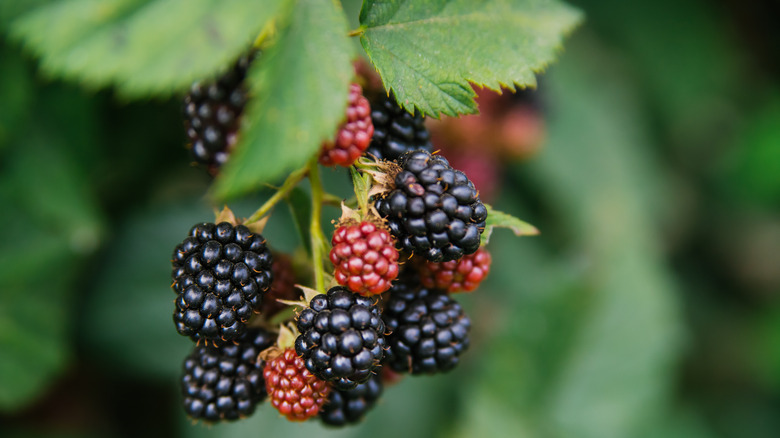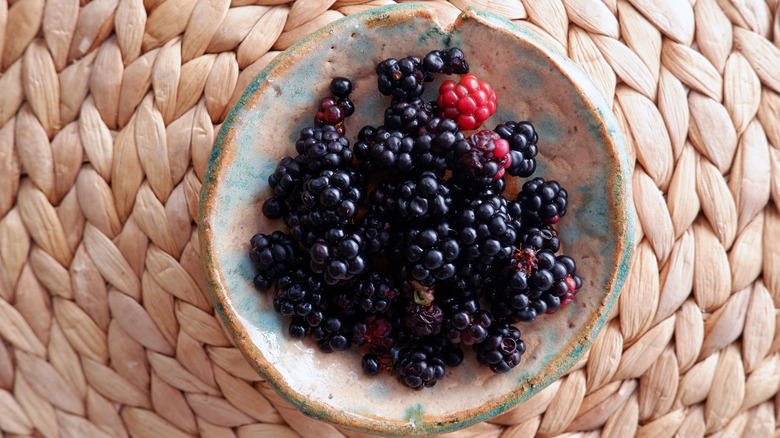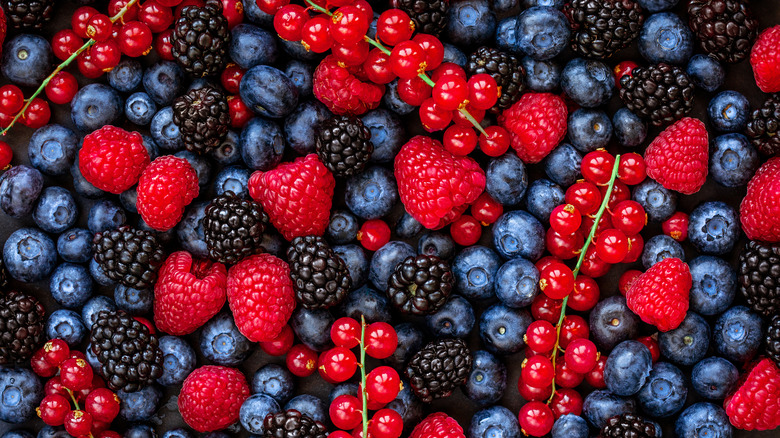Unexpected Side Effects Of Eating Blackberries
Forest-fresh or frozen — wherever you pick them, blackberries are good. They are sweet and tart, rich in nutrients, and piquant in taste. Blackberries may be tiny, but they are nutritional giants.
Berries are the golden child of summer fruit. According to the Missouri Department of Conservation, blackberry brambles are generally found in woods or thickets, often supported by trees. Blackberries are a branch off of one huge family tree, the genus Rubus. Blackberries, or Rubus allegheniensis, are cousins to fruits like raspberries and dewberries. For foragers, the thorny stems may stick you, but once you collect a bunch, you'll enjoy them with no regrets.
The combination of phytonutrients in blackberries makes them undeniably healthy. The Missouri Department of Conservation says that blackberries are considered a "superfood" by many since they're high in nutrients and antioxidants as well as fiber, but low in fat and carbohydrates. Their succulent taste isn't their only benefit. In these tart berries, you'll find immune support, a weight loss boost, and healthy gut help from each bite (via Livestrong). Whether you bake them into a pie or top off your yogurt, you'll want every benefit they have to offer.
Read on to find out exactly what these fruity brambles are made of. You may want to eat them more often.
Blackberries can boost immune strength
Are you looking for a natural immune booster? Snack on a handful of blackberries! They are notoriously high in vitamin C. So much so that Livestrong noted that one cup alone holds around 34% of the suggested daily intake. Vitamin C is a water-soluble nutrient that works to protect the body internally (per Harvard T.H. Chan School of Public Health). According to a 2017 review in Nutrients, once we ingest it, vitamin C battles free radicals and oxidative stress that causes aging. Researchers confirmed that consuming vitamin C may shorten the length of respiratory infections and could prevent them altogether. Should we expect a berry to cure bronchitis? That's a stretch. Nonetheless, enjoying them can increase immune health.
A blackberry's deep purple pigment is more than a color. The rich hue is a sign that anthocyanins are present, according to Cleveland Clinic. These compounds are a type of flavonoid, beneficial chemicals that are plentiful in plants. An article in the Journal of Food Composition and Analysis revealed that the anthocyanins in blackberries could help slow the growth of tumor cells in people with cancer. Healthline says blackberries have the ability to aid in the repair of external wounds and skin regeneration. The fountain of youth might be in your next bowl of fruit!
Disclaimer: We're not promising instant miracles. If you're struggling with a medical condition, diet change may be helpful, but is not meant to replace proper medical care and treatment.
A weight management assist
Eating to lose weight sounds contradicting, right? But enjoying blackberries may actually help you shed pounds. How so? Fiber. Nutrition pros at Livestrong credit blackberries as a great fiber source. According to Mayo Clinic, fiber can't be metabolized (or used for energy) by the body, and high-fiber foods take longer to eat and are often more filling, which makes us feel full for longer. Once we feel full we tend to eat less, which contributes to losing weight over time. Studies published in Nutrients have also confirmed that adequate fiber intake is important for a lowered body weight.
According to Livestrong, there are more than 15 unique vitamins and minerals tucked in a tiny blackberry. A one-cup serving alongside your cereal provides over 10% of daily requirements for nutrients like manganese, vitamin E, and vitamin K. Guess which mineral blackberries are loaded with? Copper. Specialists at Livestrong say one cup of blackberries has over 25% of the amount of copper we need each day.
When you bite into a fresh blackberry, you won't have to worry about excessive sugar either. According to Healthline, blackberries are even safe for diabetics who generally minimize sugary foods in their diet. Anyone looking to lose weight may be acutely aware that sugar can lead to weight gain, but that's mainly caused by added sugars, not the natural kind like you find in blackberries. You don't need to avoid fructose (fruit sugars) to lose weight (per Integrated Eating).
A boon to bone support
Bone health becomes increasingly crucial as we grow older. Blackberries hold key vitamins that may enhance bone health for both men and women.
The Office on Women's Health reports that 80% of people who develop osteoporosis are women. This is partially due to the hormonal changes women experience during their transition into menopause. Bone strength is important for men, too. A 2014 study showed that the anthocyanins in berries may reduce inflammation and combat age-related bone loss, though scientists say more research is needed.
How can blackberries bulk up our bones? The secret is vitamin K. This fat-soluble vitamin is absorbed into the bones and fatty tissues of our body. In 2019, a study review published in the Journal of Osteoporosis concluded that low vitamin K1 intake raises the risk of men having low bone marrow density and developing fractures around the femoral area of the neck. The same bone health study highlighted that adequate levels of vitamin K1 reduce vertebral (backbone) fractures in women. Researchers also found that having enough vitamin K also decreased bone loss.
An article in Health points out that the vitamin K in blackberries is beneficial for both bone health and healthy blood clotting, while the manganese in the berries promotes collagen production for strong joints as well as positively affecting the bones. Livestrong notes that we can meet 24% of our daily vitamin K needs by eating one cup of blackberries, as well as 40% of our manganese requirements.
Get a healthier gut
Preventing colon issues may be simpler than you think — these berries could be a fruity key. Organic Facts mentions that one of the many perks of chomping on these forest berries is better digestion. The fiber found in blackberries is good for more than weight loss, as fiber prevents constipation. The insoluble fiber in blackberries absorbs water while in the large intestine, also creating "bulk" that pushes bowel movements right on through.
Nutri Advanced, a British supplement company, identifies more "berry" good gut gains of enjoying blackberries. These dark, juicy berries feed healthy bacteria that keep your gut microbiome balanced, and have anti-microbial properties that can hinder unhealthy pathogens like salmonella. The antioxidant properties specific to blackberries also combat inflammation, they say. Inflammation is the cause of conditions like irritable bowel syndrome (IBS), and balancing your gut bacteria can help to relieve IBS symptoms (per Fresh Produce Journal). This one-two punch of promoting good bacteria and reducing inflammation can "soothe a struggling gut," according to Nutri Advanced experts. If health professionals recommend a diet change to ease IBS symptoms, try adding a handful of berries to your breakfast.
In order to maintain a balanced approach, consider the disadvantages of eating blackberries, too. Livestrong says don't be surprised if your pee has a different color. Discolored urine could be a byproduct of consuming even a small bunch of berries. However, it's not a major concern unless it persists.
Fresh is best, but frozen is good too
Next time you visit your local farmer's market, pick a bunch of blackberries. While frozen berries are a great alternative, all fruit is best when it's fresh. Why? WebMD puts it this way: "Nutrients in fruit are at their peak right after being picked." Sprinkle fresh blackberries to top off yogurt, garnish a dessert, or toss them on top of a salad. Whether you find them in the forest, at the market, or in the produce aisle, shoot for the freshest fruit to get optimal benefits.
All things being equal, though, frozen fruit is still a healthy choice. It's also much more practical for busy lifestyles. If you prefer perusing the frozen aisle, it's still to your benefit; Everyday Health points out that even seemingly "fresh" fruit at the store can lose nutritional value and expire. Meanwhile, the ready-prepped fruit in the freezer has been well-preserved, frozen right after it's picked. Just be sure to keep an eye out for added sugars in frozen options, which can make them less nutritious. If you're handy in the kitchen, it's also possible to freeze your own blackberries and use them later on.
Overall, choosing blackberries is a phenomenal choice. You can enjoy them fresh or frozen. The healthiest options will be all-natural and sugar-free.






